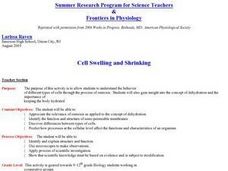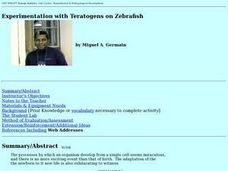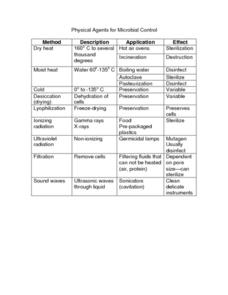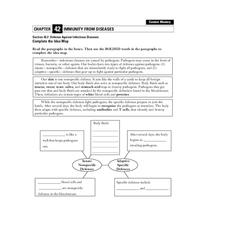Curated OER
Totally Cellular
In this biology instructional activity, students learn about cells and their various parts. They first read a page and a half of facts about cells and then answer the 10 questions in the packet. The answers are on the last page.
Curated OER
Cells
In this biology activity, students use the clues given at the bottom of the sheet to complete the crossword puzzle on cells. There are 22 clues to solve in the puzzle on cells.
Curated OER
Intro to Biology Chapters 1 & 2 Practice Test
Don't be fooled by the title - this biology quiz could serve as an AP biology or college-level biology quiz. Some of the molecules represented may be difficult to identify without seeing the textbook from which this is based. It could...
Curated OER
Diffusion across a Selectively Permeable Membrane
Lab groups fill a section of dialysis tubing with glucose and starch solutions and suspend it in a water bath. They use iodine as a starch indicator and a glucose test strip to find out if either of the materials crossed the selectively...
Virginia Department of Education
Photosynthesis and Cellular Respiration
Provide high schoolers with their own indoor gardens! Emerging scientists discuss the process of photosynthesis and germinate seeds before growing plants in multiple lighting conditions. The hands-on application allows pupils to see...
Curated OER
Cell Swelling and Shrinking
Students examine the concept of osmosis in relation to dehydration. They identify the function and structure of semi-permable membranes. They predict how certain processes can affect the characteristics of an organism.
Curated OER
Homeostasis and Cell Transport
In this homeostasis worksheet, students complete a crossword puzzle with 22 question on homeostasis and cell transport. They identify the different ways substances are transported in and out of the cell.
Curated OER
Extensions - Biology Review Unit
Learners engage in a variety of activities in order to review a Biology unit. For example, they research the Bird Flu, it's history, how it is spread, what has been done about it, what better options exist for controlling or removing it....
Curated OER
Acting Potential
Students set up a cell membrane with the material provided by their teacher and then arrange beads properly to show how the sodium and potassium ions are arranged. They then make a model representing the axon of a neuron.
Curated OER
Body Battles!
Seventh graders explain the role of white blood cells in fighting infections. In this life science lesson plan, 7th graders create flow charts showing the immune response process. They act out and play a game to simulate actions of the...
Curated OER
It's Alive!! Or, Is It?
In this cell activity, students complete 5 word scrambles and 8 true-false questions about the characteristics of living organisms and compounds found within cells.
Curated OER
Experimentation with Teratogens on Zebrafish
Students compare mitosis and meiosis with regard to chromosome number in parent cells versus daughter cells, types of cells produced, total number of cells produced, and the number of divisions. In groups, identify and differentiate the...
Howard Hughes Medical Institute
Viral DNA Integration
How do viruses hijack our cells to produce more viral particles? Junior immunologists model how viral RNA integrates into a host cell's DNA using pop beads and use interactive tools to explore a virus' genome. The teacher's guide...
Curated OER
Biology Trivia Questions
Students answer 71 questions about a variety of topics in biology. In this biology trivia lesson plan, students use the internet to find the answer to questions about the systems of the body, their structures and functions, the different...
Curated OER
Seeing Cells
Sixth graders study living cells and their functioning units. In this cell lesson students color cell diagrams, answer questions and discuss the differences between plant and animal cells.
Teach Engineering
Edible Algae Models
Sometimes it's okay to eat your science experiment. A hands-on activity has pupils create models for algae to learn about its cellular structure. The best part of the experiment? The resulting juice-filled gels are edible—yum!
Curated OER
Mitosis Cookies Activity
Reward biology learners for working hard in their mitosis lesson with a sweet snack at the end! They begin by twisting apart creme-filled cookies and using the icing as a cytoplasm. Colored candy sprinkles make up chromosome pairs, which...
K20 LEARN
Speedy Cat: Enzymes
Enzymes have a need for speed! What happens when they are forced to slow down? A well-rounded lesson plan from the K20 Center examines enzyme activity through role playing and a lab. Biology scholars work in teams and pairs to understand...
Curated OER
Meiosis Starts With?
How do you fill in the blanks about meiosis? With this handout! Most of the blanks have a letter filled in to give learners a hint. This resource is a good way for young biologists to ensure they have learned all the necessary vocabulary...
Curated OER
Physical Agents for Microbial Control
For this biology worksheet, students take part in an examination of the graphic organizer to determine the different types of environments and how they effect the survival of microbes.
Curated OER
Science Lesson Plans
Young scholars conduct a variety of exploration activities on various science topics. In this science lesson outline, students design a cell encapsulation to hold a specific type of medicine. They give examples of physical and chemical...
Curated OER
Defense Against Infectious Diseases
In this infectious diseases worksheet, students read about the two types of defenses the body has against pathogens: innate (nonspecific) and adaptive (specific). Students then complete a graphic organizer by filling in 11 blanks.
Curated OER
Plant Cells and Tissues
In this plants worksheet, students review 17 vocabulary words associated with the different types of plant cells and tissues. This worksheet has 17 matching questions.
Curated OER
Viruses
In this biology lesson, students complete a crossword puzzle with 35 questions about viruses. They identify the different types of viruses and the diseases they bring.

























